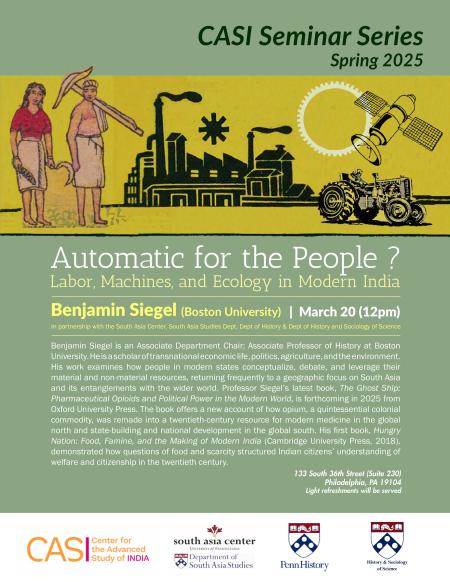Automatic for the People? Labor, Machines, and Ecology in Modern India
Ronald O. Perelman Center for Political Science & Economics
133 South 36th Street, Suite 230
Philadelphia PA 19104-6215
About the Seminar:
For Indian economic thinkers at the dawn of the 20th century—and their sympathetic observers abroad—India's industrial ascendance seemed inevitable. The nation's textile workers operated the same spinning frames and mule spindles used in England, signaling what many believed would be India's imminent mechanized transformation. Yet India's "failure" to fully industrialize remains one of development economics' most perplexing puzzles. Postcolonial analyses have foregrounded managerial shortcomings, institutional constraints, and class dynamics, but have largely overlooked an equally crucial parallel discourse. In the same period, Indian thinkers were advancing profoundly new questions of ecology and population that pitched the promise of automation against an existential dilemma: if India indeed industrialized, what would become of human labor itself?
About the Speaker:Benjamin Siegel is an Associate Department Chair; Associate Professor of History at Boston University. He is a scholar of transnational economic life, politics, agriculture, and the environment. His work examines how people in modern states conceptualize, debate, and leverage their material and non-material resources, returning frequently to a geographic focus on South Asia and its entanglements with the wider world. Professor Siegel’s latest book, The Ghost Ship: Pharmaceutical Opioids and Political Power in the Modern World, is forthcoming in 2025 from Oxford University Press. The book offers a new account of how opium, a quintessential colonial commodity, was remade into a twentieth-century resource for modern medicine in the global north and state-building and national development in the global south. His first book, Hungry Nation: Food, Famine, and the Making of Modern India (Cambridge University Press, 2018), demonstrated how questions of food and scarcity structured Indian citizens’ understanding of welfare and citizenship in the twentieth century.

